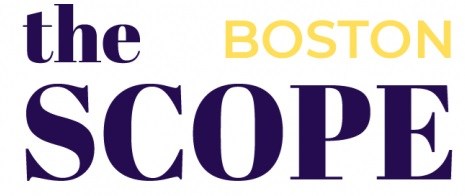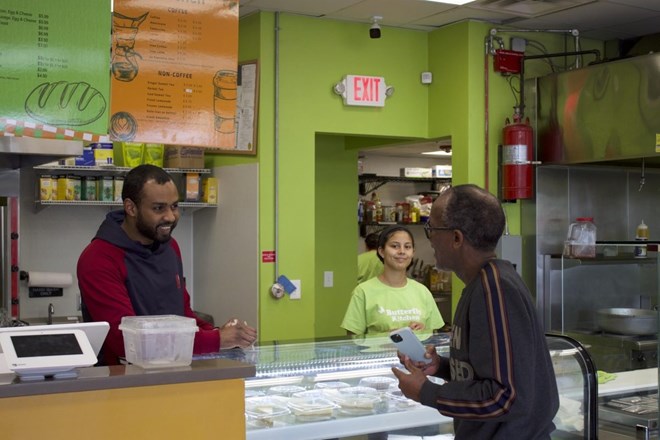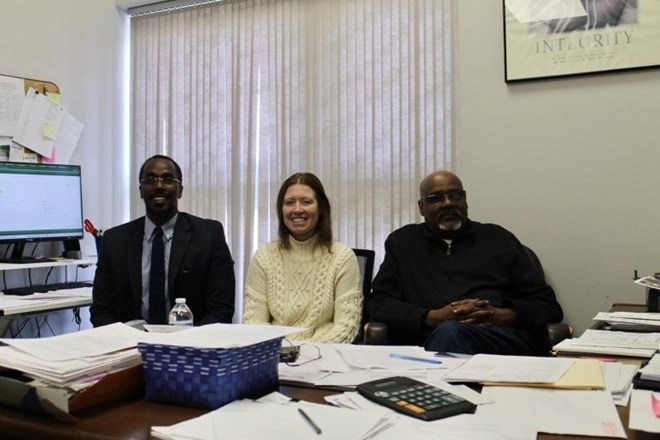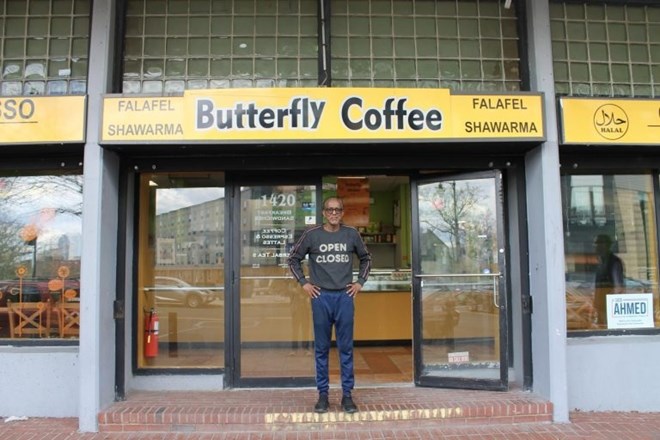
Sunday December 29, 2024
By Aiden Stein
Photo: Aiden Stein

Workers greet Abdillahi Abdirahman, owner of Butterfly Falafel, in Roxbury. Butterfly Falafel is Somali-owned and was opened with the support of Somali Development Center.
During President-elect Donald Trump’s first presidency, Somali immigrant and founder of the Somali Development Center (SDC) Abdirahman Yusuf spoke out against Trump’s travel ban that targeted predominantly Muslim countries. Now, Trump is preparing for another round of anti-immigrant policy, calling for mass deportation and the undoing of the 14th Amendment which guarantees birthright citizenship in the United States. Government agencies, shelters and immigrant-led groups like SDC — which supports immigrants regardless of their immigration status — are readying for a hard road ahead.
Founded in 1996, SDC was the first African social services organization in Boston. Said Ahmed, now 41 and CEO of non-profit United Somali Youth, moved to Boston from Somalia when he was 12 years old and was in the first cohort of SDC. He feels the group’s support was foundational to his ability to land on his feet and ultimately found a youth sports program, earn a PhD, teach at Harvard and run for City Council in Boston’s 7th district. (Following Boston City Councilor Tania Fernandes Anderson’s arrest on federal indictment charges, Ahmed has another chance at the seat, and has filed his campaign). SDC was a place where he belonged, and it bolstered him.
“It’s really important to have a community that you can identify with,” said Ahmed. “The Somali Development Center is where we see ourselves, something that we own, a piece of cake that’s ours.”
As refugees from Sub-Saharan Africa arrived in the area during the 1990s, Yusuf and his peers saw the need for more support.
“Because of the challenges of language, religion and racial issues, we thought it was absolutely necessary to establish an organization that could work with these people,” he said.
Contrasted with a resettlement agency, an organization which provides initial assistance and shelter to refugees and is only required to do so for 3 months, SDC is a post-resettlement agency that provides counsel and resources until they are no longer needed.
“We wanted to help them assimilate and succeed and integrate into society so they have a better life than the one they left,” Yusuf said.
SDC works in conjunction with a network of local and governmental organizations to assist with settling immigrants, including the Refugee and Immigrant Assistance Center (RIAC). RIAC is a nonprofit resettlement agency only a few blocks away from SDC which collaborates with their Washington parent company, the Ethiopian Community Development Council (ECDC), one of nine national agencies authorized by the Department of State to resettle refugees in the United States. They identify people in temporary living situations for resettlement, give them an apartment, link them to public assistance, get their kids into school, get immunizations and connect them to work opportunities for the required 90 days.
“Right now you can imagine it, no one can get everything done in three months, so folks need to go to other sources for support,” Yusuf said. This is where SDC comes in.
Yusuf emphasized that anyone is welcome at SDC. While public resources were long limited exclusively to American citizens, laws like the 1996 welfare reforms and 2024 Compacts of Free Association (COFA) have expanded eligibility for certain “qualified” immigrant categories including lawful permanent residents, refugees and Cuban and Haitian entrants. Regardless of immigration status, people have Constitutional rights and many states, including Massachusetts, have protections for employment, housing and civil rights.
“Monday to Friday, the doors are open here for people to walk in — our clientele from East Africa, North Africa, West Africa, Afghanistan, Ukraine, Hispanic folks, you name it,” Yusuf said. “Anyone who’s a refugee or immigrant and needs assistance walks in and we help them when we can, and if we cannot, then we connect them to the right place.”
The challenges immigrants face include affordable housing, language barriers, cultural acclimation, healthcare and adjusting to school. Currently, SDC is assisting Afghan refugees, who are facing the same struggles that Somali refugees were in the 1990s and 2000s.
“It’s like starting anew in a completely new country, new culture, new language, new everything, and that’s their challenge. Our challenge is lack of resources, enough manpower or people who know how to do these things, who can understand the folks to deliver [these] services and help people move into more stable lives,” Yusuf said.
Though their team is small, SDC serves anywhere from five to 10 people per day, five days a week. Clients of SDC have gone on to earn degrees and find jobs, start and run businesses and help their children do the same.
Colleen Leddie, program director at SDC, comes from a second-generation Irish immigrant family and has been a social worker with SDC for three years now. She says that watching the hard work it took her grandparents to find success and establish themselves has inspired her to help others do the same.

CEO of United Somali Youth Said Ahmed, SDC Program Director Colleen Leddie and SDC founder Abdirahman Yusuf in the SDC office in Roxbury. (Photo: Aiden Stein)
Munira Farah, a health services coordinator at SDC, assists clients with jobs, rent relief and housing applications, and otherwise advocates for those who may struggle to do so.
“Meeting the needs of people is really important to me,” Farah said. “Learning about people every day and seeing different personalities really inspires me to do the work that I do.”
Farah studied psychology at Lesley University and always wanted to find a way to give back and help people. Farah’s parents came to the United States as refugees and have worked with the SDC. Farah offers translation for Somali newcomers. In October of 2022, she was working to bring a family from Ethiopia that had been separated from its U.S. counterparts for four years. The Ethiopian family ended up getting picked for an interview, something Farah said doesn’t normally happen.
“I’m pretty proud of myself that I’m the reason why someone’s family is here,” Farah said.
SDC also works with the Dewitt Center and Boston Public Library in Roxbury to teach English classes, as language is one of the most important hurdles.
“They have to learn English or they can’t get anywhere,” Farah said. “We were instrumental in hiring bilingual Somali-certified teachers from all over the world.”
When a language barrier is encountered, SDC calls on interpreters and translators, as well as region or language-specific organizations also working to assist immigrants.
SDC has a long-standing partnership with the Haitian American Public Health Initiative, a 35-year-old social service nonprofit in Mattapan that assists Haitian immigrants and refugees and provides SDS with interpretation for its Haitian clients. SDC works with people connected to the Immigrant Family Institute, a Haitian-led nonprofit that assists immigrants of all ages with attaining basic needs and legal assistance, as well as educational, workforce and wellness programs.
“These people come from the border—they’re looking for a safe place, they’re looking for a better life, which they can get here,” said Abdillahi Abdirahman, owner of Butterfly Falafel, an immigrant-owned and operated staple of the Somali community in Roxbury. “The people who are complaining, if they [are] not an immigrant, their parents are immigrants or their grandparents are immigrants, they just have to know that.”

Abdillahi Abdirahman, owner of Butterfly Falafel, in Roxbury. Butterfly Falafel is Somali-owned and was opened with the support of Somali Development Center.
Abdirahman, once a board member of the SDC, continues to be a mentor and advocate in his community. On display at his restaurant are Said Ahmed’s City Council campaign posters. They are also displayed at Ashur Restaurant, another Somali-owned business that SDC had a hand in helping establish.
Somali businesses, support groups and youth organizations have flourished as the community has grown, with religious services bringing people together at the Islamic Society of Boston Cultural Center (ISBCC) and the Boston Islamic Center. The nearby Jeep Jones Park is frequently full of Somali kids coming from the ISBCC to play basketball. When people were struggling during COVID-19, this robust community was central to keeping their businesses open.
“If you look at Roxbury, there’s a lot of Somali businesses, that’s changed — it changed for the better, and the community culturally and politically has diversified,” Abdirahman said. “That’s what immigrants will do, everywhere they go, everywhere they come from.”
For immigrants and asylum seekers currently navigating their resettlement in the U.S., SDC and its partners want to help.
“At the end of the day, we are obligated to help strangers,” Abdirahman said. “We have to show them sympathy and kindness. We have to welcome strangers — it doesn’t matter what color.”